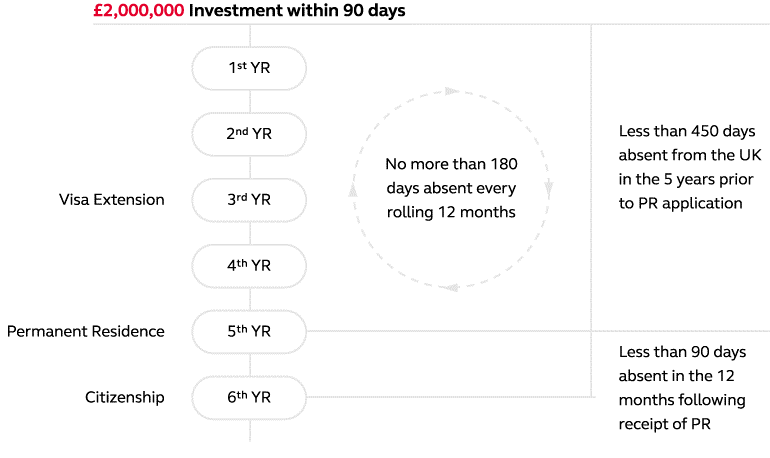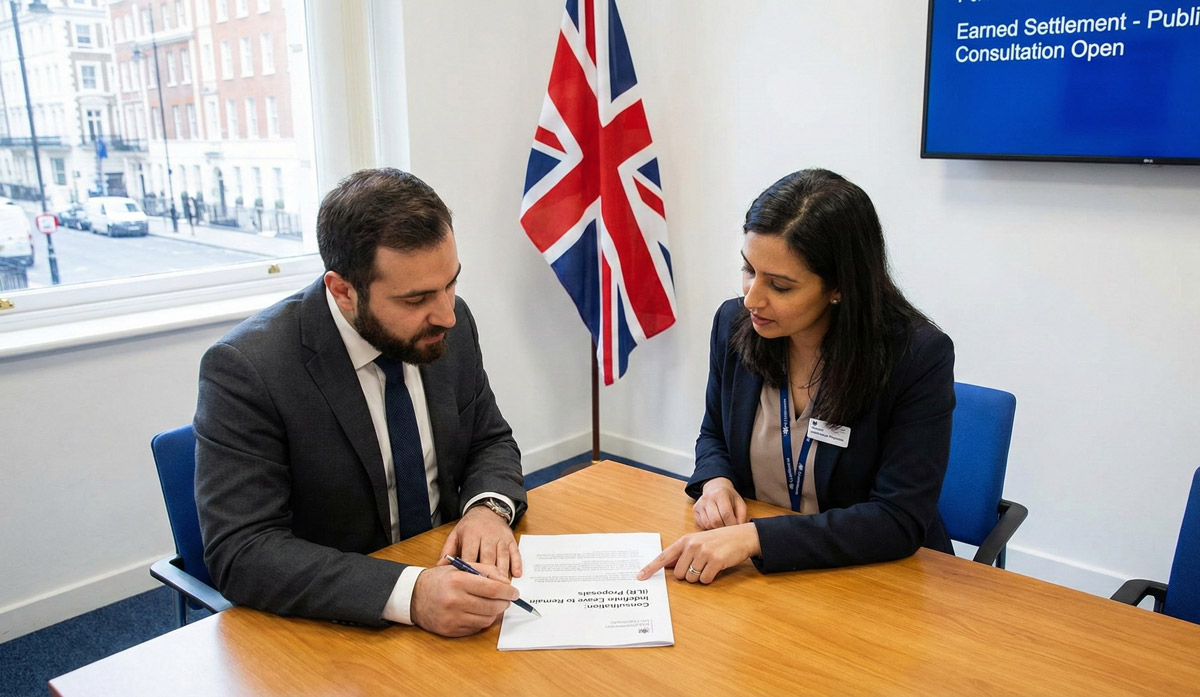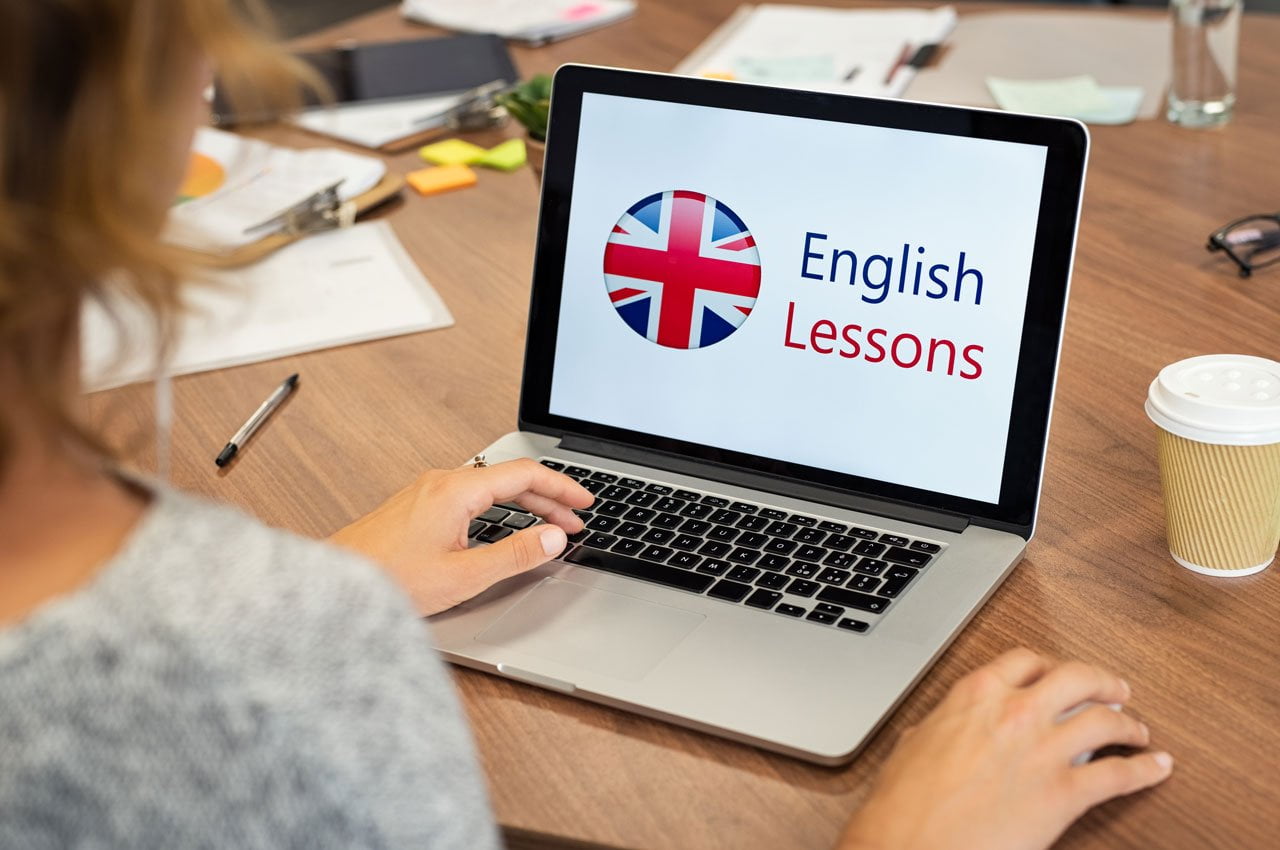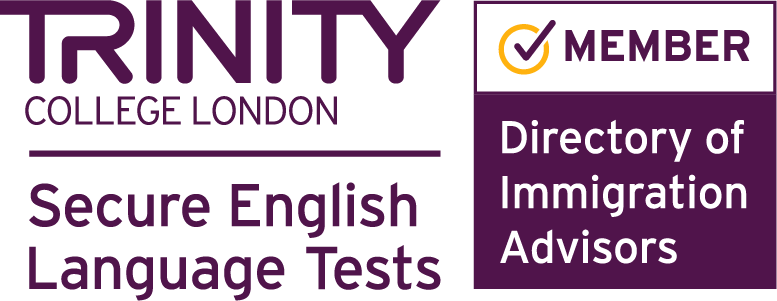Consultation on Indefinite Leave to Remain
Background
Indefinite Leave to Remain (ILR) in the United Kingdom is currently granted to eligible individuals after a set qualifying period. However, there is now a proposal to revise this system, introducing an “earned settlement” approach that would replace the existing entitlement based solely on time spent in the UK.
Consultation Timeline
The consultation on these proposed changes is open for submissions until 12 February 2026. According to the Home Secretary, the intention is to begin implementing the new policy in April 2026.
Groups Unaffected by the Proposal
Certain categories will remain unaffected by the proposed changes. Specifically, parents, spouses, and dependants of British citizens, as well as individuals from Hong Kong holding British National (Overseas) status, will see no change to their ILR entitlement. Additionally, those with leave under the EU Settlement Scheme are excluded from these proposals, as their status is protected under the withdrawal agreement.
Who Will Be Affected?
A key issue addressed in the consultation is to determine who will be affected by the revised ILR rules. The consultation will also consider the position of people currently residing in the UK.
Without the inclusion of transitional provisions, all other immigration routes not specifically excluded—and for which settlement has not yet been reached—would be subject to the new 10-year period before qualifying for ILR.
Dependents
Dependents will be assessed separately from the main applicant, considering their own specific circumstances and attributes. Therefore, someone admitted as a dependent of An economic migrant may not have the same qualifying period.
Asylum seekers/refugees
Since these proposals target individuals already living in the UK, those currently residing in the UK with refugee status could be impacted unless transitional provisions are implemented.
In summary, the consultation will address integration, contribution, and residence.
Sole Representative Visa
What is a Sole Representative Visa?
A sole representative visa allows for companies overseas to send a senior representative from their overseas branch to create a commercial presence, branch or subsidiary, within the UK. The visa is initially granted for a maximum term of three years but there may be potential for the visa to be extended for a further two years. After legally completing five years on this route, the migrant may be eligible to apply for settlement.
Eligibility Summary:
- The representative must be an existing employee of the overseas company and must be a senior member, but not the owner or hold significant control.
- The representative must have the required skills, experience, and knowledge to conduct the role within the UK.
- They must intend to create the company’s first commercial presence in the UK.
- The company’s headquarters and primary business must remain outside of the UK.
- The representative must have enough funds to be able to financially maintain themselves without recourse to public funds.
- There are restrictions on what the migrant can and cannot do. In summary, they must continue to work solely for the sponsor’s company, they cannot switch to this visa from any other visa and cannot apply for public funds.
- The representative must meet the English language requirement. They must either pass an approved English language test or hold an academic qualification which is approved by the Home Office for the purpose of this visa. They may not have to meet this requirement if they’re from a majority English speaking country. One of our expert immigration lawyers can guide you on this.
- If the representative is coming from a specific country, they may need to provide a clear Tuberculosis test result.
Documents
There are many documents which you will need to provide to satisfy the Home Office that the representative is eligible to be granted a sole representative visa.
These range from identity documents, evidence that the representative can support themselves whilst living in the UK, financial documents, company and employment documents to sponsorship evidence and precise details of the employment which will be conducted in the UK.
The documents and information required can range vastly and to ensure all supporting evidence is provided, we recommend contacting one of our highly skilled immigration lawyers to guide you and your company through the process.
We strive to work closely with the migrant and sponsor company to ensure you feel well informed throughout the process and to answer any queries which may arise.
The Process
After initially contacting one of our expert immigration advisors, we will converse with the sponsor’s company to fully understand the reasons for the employee to represent the company here in the UK.
We will help you to ensure that your representative fully complies with the Immigration Rules and Sole-Representative requirements and will only submit the application once we are confident in the success of the application.
We will provide you with a list of documents and a questionnaire which is tailored to your company and the specific requirements. You will then provide us with the necessary documents and complete the questionnaire for us to complete the online application form.
Gradually, as you provide documents, we will build the case and prepare all our legal representative letters and draft any required declarations for you to sign.
Once the application is ready and we are satisfied with the chances of success, we will submit the application, you will pay the Home Office the required application fees, we will book your employee’s biometric appointment and will scan and personally upload all the required evidence to the Home Office for their consideration.
Whilst the decision is pending, if the Home Office contact us with any further legal questions or require further documentation, we will converse with them directly and specifically tell you if you need to provide us any further documents. By allowing us to manage the application, this allows for you and your employee to continue focusing on your company and employment without the confusions which the visa process can bring.
We will keep you fully updated on the process of the application, and you will receive the decision as soon as it is reached by the Home Office.
Fees and Timescale
If you are applying from outside the UK, the Home Office should take a decision within 3 weeks after the biometric appointment. This is known as standard service, and you will need to pay the Home Office fees of £610.
In addition, you will need to pay the Immigration Health Surcharge (£624 per year) which permits the use of the UK health system for the duration of the visa.
If an application is made from within the UK, the Home Office should take a decision within 8 weeks after the biometric appointment. The Home Office fees will cost you £704 and again, the Immigration Health Surcharge will need to be paid.
The option to pay for a priority service, at an extra cost to the Home Office, may be available and you will receive a decision much faster. You can discuss this option with one of our immigration solicitors.
Dependants
In addition to the main employee being granted entry clearance as a sole representative, we can assist in the application for your dependants to join you here in the UK. This can include your husband, wife or partner and your children who are under eighteen.
We will guide you step by step through the process and tell you exactly which documents are needed to support their case. Their visas will be granted in line with the main applicants, and they also need to pay the required Home Office fee and Immigration Health Surcharge.
Contact our expert immigration lawyers today to begin the process and to be offered a free initial consultation.
Tier 1 Investor
The Tier 1 Investor visa is a route for high-net-worth individuals with access to at least £2,000,000 to invest in the UK and is only applicable for applicants from outside the European Economic Area and Switzerland.
The initial visa is granted for 3 years and 4 months (3 years if processed in the UK). After this time, applicants can apply for a 2-year extension provided they meet the eligibility criteria. If an applicant has spent a continuous period of 5 years in the UK, they can apply for Indefinite Leave to Remain (ILR). Accelerated routes to settlement can be sought after 3 years if investments total £5 million, or 2 years if investments total £10 million. Knowledge of the English language is not a requirement for the initial visa but is required for subsequent ILR applications.
Investment has to be inactive and trading UK registered companies, by way of share capital or loan capital.
Tier 1 (Investor) routes to settlement are dependent on investments made:
| £2 M | £5 M | £10 M |
| ILR after 5 years | ILR after 3 years | ILR after 2 years |
| Citizenship after 6 years | Citizenship after 5 years | Citizenship after 5 years |
Entry clearance applications
There are certain requirements to be met when applying as a Tier 1 Investor. Applicants have to meet the following criteria:
- Provide evidence of holding at least £2,000,000 in investable funds.
The funds should be available to be transferred to and invested in the UK. - Have opened a UK investment account at an FCA-regulated institution.
- Meet good character requirements and have a clean criminal records statement.
Key benefits when applying as a Tier 1 Investor:
- Fast visa processing and straightforward visa requirements.
- There are no English language requirements or language tests in the initial application.
- There is no individual maintenance requirement.
- Investor’s Immediate family members, spouses, and children under 18 are also eligible to enter the UK.
- Applicants are permitted (but not obliged) to work, study or engage in business activities in the UK.
Tier 1 (Investor) visa extensions
Tier 1 (Investor) visa holders can extend their stay in the UK if the following conditions are met:
- Evidence must be submitted to prove that the applicant’s first entry to the country was within 30 days of the date the clearance was granted.
- Evidence must be provided that all associated adults (for example spouses etc.) were registered with the Overseas Visitors Records Office within 7 days of arrival in the UK.
- Applicants must provide proof that they have not acquired public funds of any kind.
- Applicants must include any dependents on their current visa in the extension application, including children who turned 18 during the initial visa period.
- The minimum threshold for investment funds is £2,000,000 which must be under the Applicant’s control in the UK.
- There have been changes announced for those who entered the category before November 2014.
Indefinite Leave to Remain Applications
If an Applicant has spent a continuous period of 5 years in the UK, they can apply for ILR. Accelerated routes to settlement can be sought after just 3 years if your investments total £5M, or just 2 years if total investments total £10M.
Applicants are required to meet the following criteria:
- Applicants must not have spent more than 180 days outside of the UK in any 12-month period.
- Applicants must have passed the Life in the UK Test.
- Applicants must meet the English Language requirement, which can be done by passing a language test in conformance with B1 of the Common European Framework of Reference for Languages. There are certain set exemptions to meeting the English Language requirement.
Residency Requirements and Time Spent Outside the UK:
- If applicants do not intend to settle in the UK then no residency requirements are set, and they may extend their visa for 2 years after the initial clearance has expired.
- Those wishing to apply for permanent residency (ILR) are not permitted to spend more than 180 days outside the UK, in any rolling 12-month period.
- For UK citizenship, applicants must not have spent more than 450 days outside of the UK in the 5-year period, and no more than 90 days during the 12 months prior to application.
Processing Time:
- The earliest that applicants can submit visa requests is 3 months prior to travel to the UK.
- Applicants can pay for a Priority Service to receive a decision within 5 working days.
- Non-priority processing times for entry clearance applications are approximately 3 weeks if submitted from the country of residence, or approximately 8-12 weeks for those switching their visa and currently residing in the UK.
UK Residency & Citizenship via Tier 1 (Investor) visa

The Difference Between the 5-year and 10-year Partner Route
Whether you are applying for leave to remain in the UK or have obtained leave to enter and are now extending your visa, you may have heard of both the 5-year and 10-year routes.
The primary difference is that if the Home Office decides that you meet all of the requirements and for leave to remain under the Immigration Rules, then you will be placed on the 5-year route. This means that the first visa which you have been granted is valid for two and a half years and then before this visa expires, you will apply for another visa that is valid for the same amount of time. Once you have completed five years on this route legally, you will be eligible to apply for Settlement, provided that you meet all of the other requirements for settlement.
If you are already in the UK and are applying to extend your visa, if the Home Office decides that you do not meet one of the requirements i.e., the English language requirement, but would find it unduly harsh to refuse your visa, then they will likely put you on the 10-year route to settlement. This means that you will be eligible to apply for settlement once you have legally completed 10-years on this route.
It is important to remember that if you are already on the 5-year route but happen to be switched on to the 10-year route or, you are on the 10-year route but begin to meet all of the requirements so decide to switch on to the 5-year route, then your clock to settlement will restart. For example, if you have completed 2 and a half years on the 10-year route but then switch on to the 5-year route, you will become eligible to apply for settlement after 5 lawful years rather than a further 2 and a half, because your clock will have restarted. However, it does mean that you can become settled quicker than if you were to remain on the 10-year route.
The English Language Requirement
For almost all UK Home Office visa applications, the applicant is required to meet the English Language requirement. This means that the applicant must demonstrate to the Home Office that they have sufficient knowledge of the English language to be granted the visa.
This can be done in two key ways. The most common for the majority of applicants is to pass an approved English language test. There are four key centers that provide these tests are they are LanguageCert, Pearson, Trinity College London, and IELTS SELT Consortium. The level of English test which you must pass depends on your visa and which level in the process you’re at for example, for entry clearance, the applicant must pass the English test at level A1. The tests intensify the longer the applicant has been in the UK.
The second way an applicant can meet the English Language Requirement is if they hold either a bachelor’s or postgraduate degree which was taught in English. You will need to provide either your official transcript or degree certificate to prove that you have the academic qualification. If you have a qualification at this level but it was not taught in English, you may still be able to satisfy this requirement. Ask one of our expert immigration advisors about UK Naric.
Lastly, if you are from one of the following English-speaking countries, you are exempt from meeting the English Language Requirement and do not need to satisfy the requirement. The countries are Antigua and Barbuda, Australia, The Bahamas, Barbados, Belize, Canada, Dominica, Grenada, Guyana, Jamaica, Ireland (for citizenship only), Malta, New Zealand, St Kitts and Nevis, St Lucia, St Vincent, and the Grenadines, Trinidad and Tobago and the USA.
An applicant is also exempt from meeting the English language requirement if they are over 65 years old on the date of application or are unable to meet the requirement because of a long-term physical or mental condition.
One of our expert immigration Solicitors can confirm for you exactly what you need to do/ provide to meet the English language requirement and can even book your English test for you if you are facing difficulties.
Civil Partnership Visa
Do you have a civil partner who is looking to join you in the UK? Or are you looking to extend your civil partnership visa?
At Intime Immigration, we can guide you through the process step by step and advise you and your partner exactly what you need to significantly increase the chances of being granted a civil partnership visa.
There are many requirements that you are your partner must meet but importantly, your civil partnership must be recognized in the UK. Additionally, you must satisfy the UK Home Office that your relationship is genuine and subsisting, the financial requirement is met, you will be adequately accommodated and you meet the English language and Tuberculosis requirement, if applicable to you. There are also many other eligibility and suitability requirements that one of our immigration solicitors can assess for you.
Alternatively, if you are not yet married and have an intention to marry your civil partner here in the UK, we can assist you with your proposed civil partnership visa which will permit you to enter the UK to enter into a civil partnership. This visa will be valid for six months and before the expiry, you will need to apply for an extension which will be valid for two and a half years.
If you would like your civil partner to join you here in the UK, you have an intention to marry your civil partner or you would like to extend your visa, contact one of our expert immigration lawyers today for a free consultation and assessment of your case.
The Difference Between a Marriage Visit Visa and a Fiance Visa
Are you looking to come to the UK to get married? Well, there are two main options available to you, however, there are significant differences between them.
Starting with their similarity, both the fiancé visa and marriage visit visa are visas granted for a period of six months and allow you to enter the UK with the purpose of getting married within the duration of your six months visa.
However, the key difference is that the fiancé visa is on the settlement route which means that you can enter the UK, get married, but then you can apply to extend your leave as a spouse before the expiry of your visa without leaving the UK.
Whereas the clue is in the name with a marriage visit visa. It is a visit visa so once you are married, and before the expiry of the visa, you must leave the UK and return to your country. Once you have left, only then can you apply for Spouse Entry Clearance to return to the UK. If you do not leave and stay beyond the validity of your visa, you will be illegal within the UK, and this can cause you many problems later down the line.
Another key difference is the price and eligibility requirements. Because the fiancé visa is on the settlement route, there are many eligibility requirements such as financial, accommodation, relationship, English language, tuberculosis, etc., which you must meet to be granted entry clearance as a fiancé. The Home Office Application fee is also much higher than the marriage visit visa as you’re able to remain in the UK and do not have to leave. Additionally, when you are applying for leave to remain as a spouse, you will need to repay the Home Office application fee and will also need to pay the Immigration Health Surcharge, which permits you to use the healthcare system for the duration of your visa.
The marriage visit visa is a much cheaper option and there are fewer eligibility requirements and can be an option for those who do not yet meet all the requirements for a fiancé visa. However, remember that you must leave the UK before your visa expires, and also, you will not be able to re-enter as a spouse until you meet all of the requirements for entry clearance as a spouse.
The decision for which is option is best for you and your partner can be a difficult and complex one and our expert immigration lawyers are available to talk you through the process and a free meeting to discuss your case. Call us today to discuss your options.
Visit Visa to the UK
There are several different reasons why you may want to visit the UK and the Home Office recognizes this by offering a number of visit visas for different reasons. These can range from visiting family and friends, for medical reasons, business, study, volunteering, and more. However, it is not a simple process and there are restrictions as to what you can and cannot do whilst you are here.
One of the most common reasons to visit the UK is to spend quality time with family and friends. Do you have close family members or friends who you would like to come and visit for a short period of time in the UK?
A standard UK visit visa can allow for your family and friends to come and visit you for up to six months provided that you can demonstrate that you will adequately maintain and accommodate them. It must be proven that their stay can be financed appropriately and their whole stay will be without recourse to public funds. Many sponsorship documents must be provided to satisfy these requirements and where the Home Office raises any doubt regarding the applicant’s intention to return to their home country, the visa may be refused.
Visit visas are one of the most difficult visas to be accepted by the Home Office and can easily be refused for a wide number of reasons.
Working with an expert immigration solicitor, the purpose of the visit can be clearly explained and legally represented in the strongest way possible. There may be a much stronger reason for the visit such as for medical or care reasons, and where this is the case, it may be possible to apply for a longer visit visa such as for up to 2 years, 5 years, or 10 years.
The documents required for a visit visa are extensive and our immigration lawyers are highly experienced in this field. Although the outcome of a visit visa is never guaranteed, the chances of success of much higher where you instruct one of our immigration solicitors and we can guide you step by step through the process and advise you which documents will support your case.
If the outcome is not in your favor, we will challenge the Home Office decision, as part of your original agreement, and will endeavor to reverse the Home Office decision.
Call today to book a free consultation with an expert immigration solicitor
The Relationship Requirement for the UK Partner Visa 2022
One of the most important requirements for your partner visa is the relationship requirement. The Home Office needs to be satisfied that the relationship between you and your partner is genuine and subsisting.
Whether you’re married, in a civil partnership, are engaged to be married, or have been living with your partner for a minimum of two years, there is a wide range of important documents which you must provide to prove your relationship.
Together with an expert immigration lawyer, you can work with us to provide all the necessary information regarding your relationship, and we can advise specifically which documents are required to ensure your relationship is reflected as well as possible.
The Financial Requirement for the UK Partner visa 2022
There are many requirements to meet for your spouse visa, fiancé visa, or civil partner visa but one of the most intricate requirements is the financial requirement.
Firstly, as the sponsor, you must be able to meet the financial requirement of £18,600. This can be achieved in many ways, but some examples include, employment, self-employment, non-employment income, and savings. However, ensuring that you provide the precise documents can be one of the most difficult aspects of being granted an entry clearance visa and in a lot of cases, can be the cause of application refusals where vital evidence is missed.
Further complications may also be introduced where you have, for example, recently changed job, you want to combine employments or sources of incomes, where you have worked for your employer for less than six months, or where your savings have fallen below the required threshold. Remember, you must also meet the financial requirement once again, after two and a half years, when your partner’s visa is due for renewal.
To minimize the risk of refusal, we recommend that you contact one of our expert immigration solicitors who can guide you step by step through the process and offer you a free consultation to ensure your application is submitted only when your financial documents are ready.













